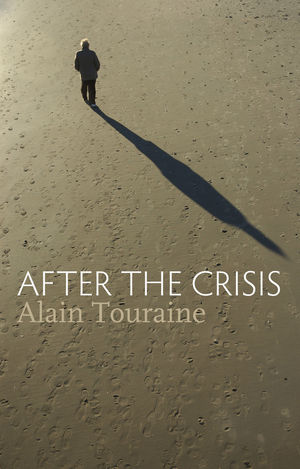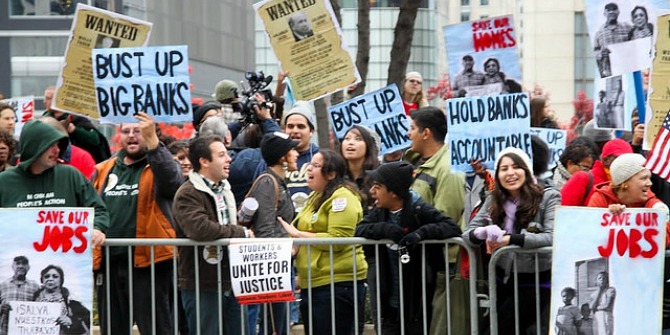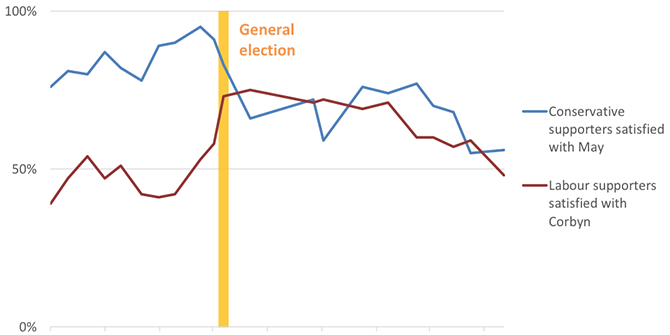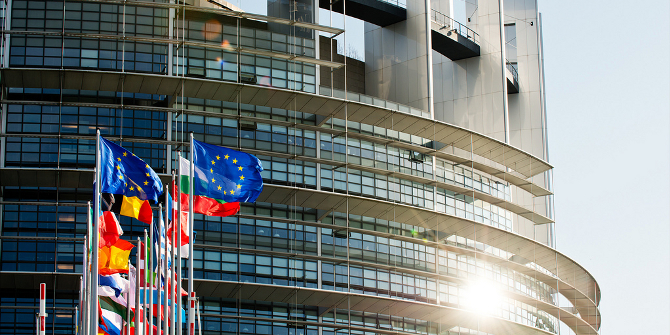 After the Crisis is a book which sheds light on the conditions which led to the crisis and on the broader crisis of the late capitalist society. It is a reading addressed to both experts and general audience who want to understand our society and to imagine a future, post-social, society born after the crisis, writes Francesco Di Bernardo.
After the Crisis is a book which sheds light on the conditions which led to the crisis and on the broader crisis of the late capitalist society. It is a reading addressed to both experts and general audience who want to understand our society and to imagine a future, post-social, society born after the crisis, writes Francesco Di Bernardo.
 After the Crisis. Alain Touraine. Polity. 2014.
After the Crisis. Alain Touraine. Polity. 2014.
This book review was originally published on the LSE Review of Books.
The economic crisis started with the crash of Lehman Brothers in 2008 and currently affecting Europe severely has been widely described as the most disruptive since the 1929 crisis. As several observers have claimed, it has not only caused considerable damage to the economies of the United States and European countries, but has also triggered severe social issues.
The latest book of the eminent French sociologist Alain Touraine analyses the social costs of this economic crisis and seeks to envisage viable alternatives to formulate an ideal of post-crisis society. The publication is an important contribution by a renowned thinker to the discussion around social transformations brought about by the current economic crisis, and around the necessity to rethink our society.
Touraine is Research Director at the École des Hautes Études en Sciences Sociales. He is also founder and Director of Studies of the Centre d’analyse et d’intervention sociologique. Touraine is one of the first thinkers who theorised the post-industrial society and has extensively written on sociology of work and specifically on working-class consciousness, social movements, and more recently on the Subject, as central principle of action of social movements.
The book is divided in two parts. In the first one Touraine discusses causes and effects of the crisis contextualising his analysis within the broader discourse around the post-industrial society and around the crisis of the capitalist society. In the second part, on the other hand, the author explores viable alternatives not only to survive the crisis but also to rethink the whole Western society. The second part reflects the real aim of the book: proposing models of society based on values and culture alternative to those of the financialised society of late-twentieth and twenty-first century capitalism.
The first two chapters of the book are dedicated to the analysis of the socio-political and economical context in which the crisis has arisen. Touraine affirms that global free-market capitalism has deeply mutated the nature of society and that what was originally believed as ‘a matter of reconstructing the economy’ has indeed determined the entrenchment of values and culture which have changed our society (p. 11). Consequently, the current crisis is for Touraine not only an economic one but it is the crisis of an entire society: ‘events of such gravity would not only call into question the management of the economy; they would affect the entire organization of our society’ (p. 11).

Touraine specifically associates the causes of the crisis with the practices of deregulated finance. In the second chapter, which is more specifically dedicated to discussing the crisis of capitalist society, Touraine affirms, in fact: ‘over the last few decades […] capital has been primarily orientated towards speculations’ (p. 25). The maximisation of profits fostered by the culture of deregulated financial sector embraced by the wealthiest elites is, according to Touraine, the cause of ‘the breakdown of the social system’ (p. 39). This ‘breakdown’ is discussed more in details in the compelling forth chapter, where Touraine criticises neoliberalism, affirming that ‘the neoliberals tried to make us believe that we were all subject to the laws of economics, that we would not be able to gain control of the economic situation’ (p. 47). He later adds that ‘these champions of economic determinism […] now appear to be primarily responsible for a crisis they have to a large extent provoked and fuelled (p. 47). However, financiers and neoliberal economists are not the only ones responsible for the state of current affairs and for the crisis; this situation would not have arisen without the silence of politicians (particularly from centre-left area who were supposed to challenge politically the neoliberal ideology), trade unionists and intellectuals (pp 48-51) who have declined their role of defenders of marginalised, poor and subaltern.
In chapter 5, Touraine begins to identify the conditions required to emerge from the crisis and to rebuild our society: ‘we need to identify a principle strong enough to mobilize us against the omnipotence of profit’ (p. 57). Key factors are for Touraine the application of morality (p. 60) and the mobilisation of the victims of the crisis (p. 63).
Chapter 5 leads us to the core sections of the book, the second part, where the author envisages four hypotheses for a future society. The sixth chapter is undoubtedly one of the most convincing. He firstly set up three hypotheses that he deems erroneous: 1) business as usual, 2) an enduring weakening of all social actors, 3) return to pre-crisis situation once they worst has passed; the author names this latter as Tocqueville hypothesis, drawing from Tocqueville’s analysis of the causes of the French revolution. (pp 74-75). The forth hypothesis formulated by Touraine comprises two possible outcomes: the first is called ‘the dark future’, which envisages the decadence of Europe, crushed in a vice between deficit and austerity, and the ‘the open future’ outcome, which is characterised by the difficulty to envisage a likely scenario (pp 79-84). The impossibility to identify a scenario alternative to the dark future, is due, Touraine explains, to ‘absence of any widespread social and political reactions during the crisis’ (p. 82). In this void, ‘the only spontaneous response to the triumph of the globalized economy will be a defensive communitarianism (p. 83). The danger, concludes Touraine convincingly, is to slip into a ‘religious individualism’ (p. 117).
Touraine therefore concludes his argumentation with a fifth conclusion: ‘the broad idea of respect of human rights must be urgently transformed into new forms of social relationships which are dynamic and not just a matter of law’ (p. 157). In other words, the French sociologist concludes, ‘the most effective response to a crisis is the reconstruction of relations between the economic actors, the establishment of a set of shared values, and new public interventions’ (p. 158).
After the Crisis is a book which sheds light on the conditions which led to the crisis and on the broader crisis of late capitalist society. It is a reading addressed to both experts and general audience who want to understand our society and to imagine a future, post-social, society born after the crisis.
Francesco Di Bernardo holds a PhD in Modern and Contemporary Literature, Culture and Thought from the University of Sussex. He is interested in the relationship between literature and history, economics, sociology and politics and the thesis he is currently finishing focuses on the representation of British history from the seventies to the post 2007-2008 financial crisis in the works of Jonathan Coe and other contemporary British authors. He is Associate Tutor at the School of English of the University of Sussex and has worked as Research Support Assistant for the School of Media, Film and Music at Sussex. Read more reviews by Francesco.







